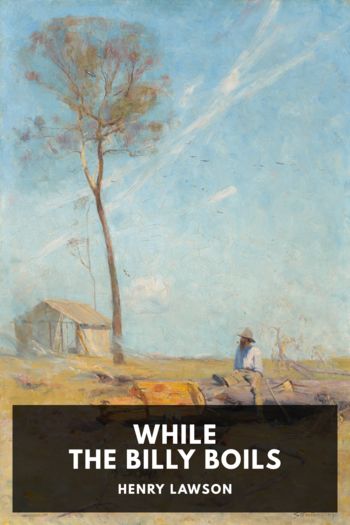While the Billy Boils, Henry Lawson [hardest books to read .txt] 📗

- Author: Henry Lawson
Book online «While the Billy Boils, Henry Lawson [hardest books to read .txt] 📗». Author Henry Lawson
It was late in the last day of the Easter Holidays, during which Arvie Aspinall had lain in bed with a bad cold. He was still what he called “croopy.” It was about nine o’clock, and the business of Jones’s Alley was in full swing.
“That’s better, mother, I’m far better,” said Arvie, “the sugar and vinegar cuts the phlegm, and the both’rin’ cough gits out. It got out to such an extent for the next few minutes that he could not speak. When he recovered his breath, he said:
“Better or worse, I’ll have to go to work tomorrow. Gimme the clock, mother.”
“I tell you you shall not go! It will be your death.”
“It’s no use talking, mother; we can’t starve—and—s’posin’ somebody got my place! Gimme the clock, mother.”
“I’ll send one of the children round to say you’re ill. They’ll surely let you off for a day or two.”
“Tain’t no use; they won’t wait; I know them—what does Grinder Bros care if I’m ill? Never mind, mother, I’ll rise above ’em all yet. Give me the clock, mother.”
She gave him the clock, and he proceeded to wind it up and set the alarm.
“There’s somethin’ wrong with the gong,” he muttered, “it’s gone wrong two nights now, but I’ll chance it. I’ll set the alarm at five, that’ll give me time to dress and git there early. I wish I hadn’t to walk so far.”
He paused to read some words engraved round the dial:—
Early to bed and early to rise
Makes a man healthy and wealthy and wise.
He had read the verse often before, and was much taken with the swing and rhythm of it. He had repeated it to himself, over and over again, without reference to the sense or philosophy of it. He had never dreamed of doubting anything in print—and this was engraved. But now a new light seemed to dawn upon him. He studied the sentence awhile, and then read it aloud for the second time. He turned it over in his mind again in silence.
“Mother!” he said suddenly, “I think it lies.” She placed the clock on the shelf, tucked him into his little bed on the sofa, and blew out the light.
Arvie seemed to sleep, but she lay awake thinking of her troubles. Of her husband carried home dead from his work one morning; of her eldest son who only came to loaf on her when he was out of gaol; of the second son, who had feathered his nest in another city, and had no use for her any longer; of the next—poor delicate little Arvie—struggling manfully to help, and wearing his young life out at Grinder Bros when he should be at school; of the five helpless younger children asleep in the next room: of her hard life—scrubbing floors from half-past five till eight, and then starting her day’s work—washing!—of having to rear her children in the atmosphere of the slums, because she could not afford to move and pay a higher rent; and of the rent.
Arvie commenced to mutter in his sleep.
“Can’t you get to sleep, Arvie?” she asked. “Is your throat sore? Can I get anything for you?”
“I’d like to sleep,” he muttered, dreamily, “but it won’t seem more’n a moment before—before—”
“Before what, Arvie?” she asked, quickly, fearing that he was becoming delirious.
“Before the alarm goes off!”
He was talking in his sleep.
She rose gently and put the alarm on two hours. “He can rest now,” she whispered to herself.
Presently Arvie sat bolt upright, and said quickly, “Mother! I thought the alarm went off!” Then, without waiting for an answer, he lay down as suddenly and slept.
The rain had cleared away, and a bright, starry dome was over sea and city, over slum and villa alike; but little of it could be seen from the hovel in Jones’s Alley, save a glimpse of the Southern Cross and a few stars round it. It was what ladies call a “lovely night,” as seen from the house of Grinder—“Grinderville”—with its moonlit terraces and gardens sloping gently to the water, and its windows lit up for an Easter ball, and its reception-rooms thronged by its own exclusive set, and one of its charming and accomplished daughters melting a select party to tears by her pathetic recitation about a little crossing sweeper.
There was something wrong with the alarm-clock, or else Mrs. Aspinall had made a mistake, for the gong sounded startlingly in the dead of night. She woke with a painful start, and lay still, expecting to hear Arvie get up; but he made no sign. She turned a white, frightened face towards the sofa where he lay—the light from the alley’s solitary lamp on the pavement above shone down through the window, and she saw that he had not moved.
Why didn’t the clock wake him? He was such a light sleeper! “Arvie!” she called; no answer. “Arvie!” she called again, with a strange ring of remonstrance mingling with the terror in her voice. Arvie never answered.
“Oh! my God!” she moaned.
She rose and stood by the sofa. Arvie lay on his back with his arms folded—a favourite sleeping position of his; but his eyes were wide open and staring upwards as though they would stare through ceiling and roof to the place where God ought to be.
He was dead.
“My God! My God” she cried.
StragglersAn oblong hut, walled with blue-grey hardwood slabs, adzed at the ends and set horizontally between the round sapling studs; high roof of the eternal galvanized iron. A big rubbish heap lies about a yard to the right of the door, which opens from the middle of one of the side walls; it might be the front or the back wall—there is nothing to fix it. Two rows of rough bunks run round three sides of the interior; and a fireplace occupies one end—the kitchen end. Sleeping, eating, gambling and cooking accommodation for thirty men in about eighteen by





Comments (0)